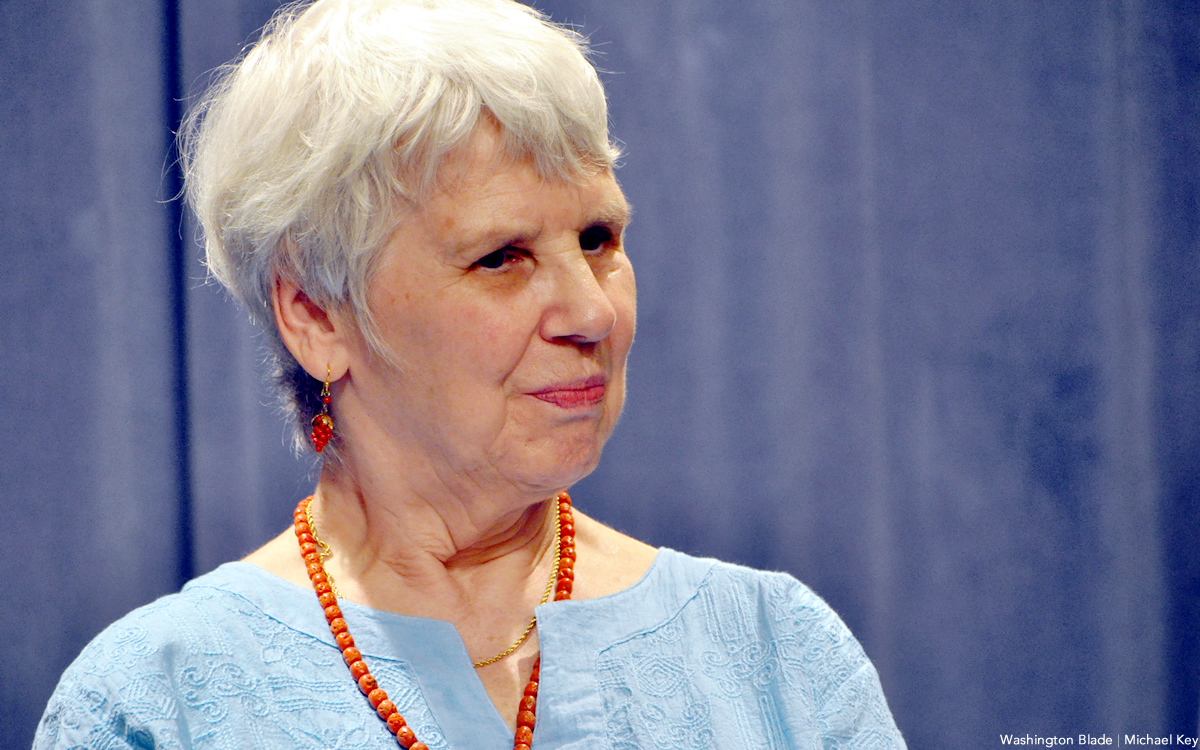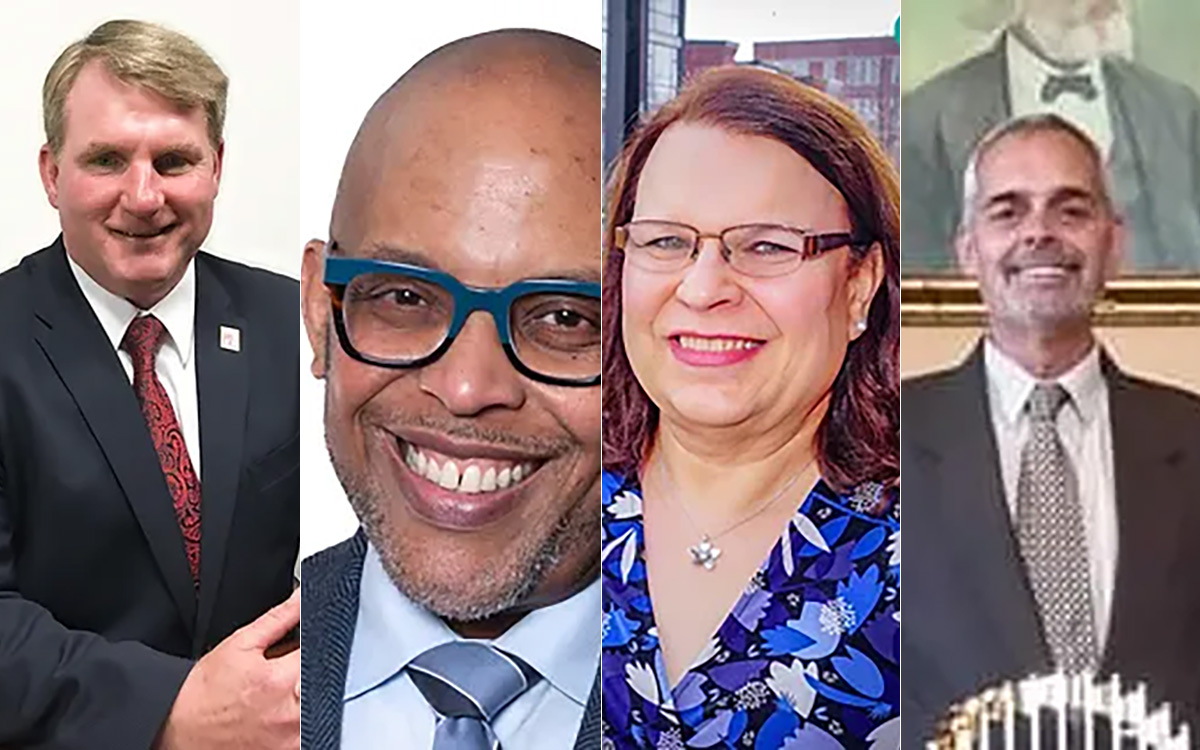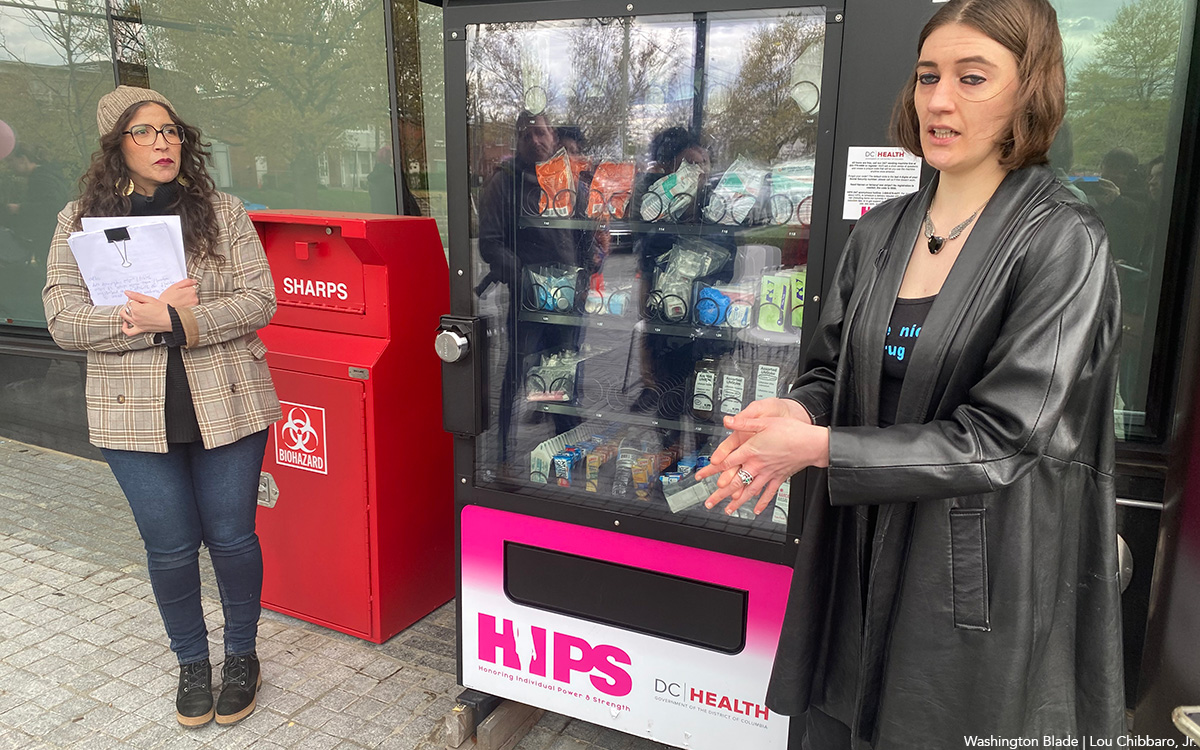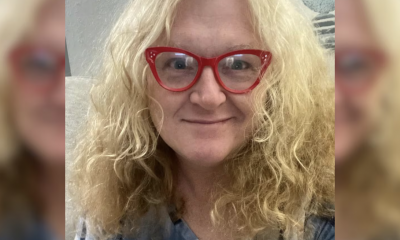Local
Slain D.C. middle school principal was gay
Brian Betts hailed as innovative educator, hero to students
Brian Betts, the highly acclaimed D.C. middle school principal who was found shot to death April 15 at his home in Silver Spring, Md., was out as a gay man to a circle of friends and D.C. public school system colleagues, multiple sources have told the D.C. Agenda.
Montgomery County police said they discovered Betts’ fully clothed body in a second floor bedroom in his house along the 9300 block of Columbia Boulevard in Silver Spring. Police noted there were no signs of a forced entry into the house, leading them to believe that Betts, 42, invited his killer or killers inside.
Police spokesperson Sgt. C. Thomas Jordan said he could not comment on whether Betts’ murder was related to the slain principal’s sexual orientation, saying only that homicide detectives were investigating all possible angles of the case to identify a suspect or suspects.
“I know our investigators are talking to everyone they know of to get to the bottom of the case,” he said. “We are going to investigate every avenue. Our role is to solve a homicide.”
Betts established a reputation as a rising star in the Montgomery County public school system as a teacher and assistant principal before D.C. Public Schools Chancellor Michelle Rhee recruited him to join her and Mayor Adrian Fenty’s efforts to overhaul the District’s long troubled school system.
In 2008, Rhee named Betts principal of Shaw Middle School at Garnet-Patterson, a recently reorganized school in the city’s historic Shaw neighborhood. School officials said he quickly emerged as one of the school system’s most innovative principals.
The Washington Post reported that students liked him so much that they asked and Rhee agreed to allow 100 students to remain at the middle school for their ninth grade instead of the normal process of advancing to another school for that grade.
“The unexpected death of Brian Betts is unspeakably tragic for his family, for the Shaw Middle School community, and for all of D.C. Public Schools,” Rhee said in a statement.
“Brian Betts had the courage to take on the leadership of a struggling, underperforming DCPS school,” she said. “He was an inspirational leader for the teachers and for the students, and that leadership was bringing results. He knew what the children under his care were capable of, and he was determined to show them how to get there.”
Montgomery County police disclosed that D.C. police found Betts’ blue Nissan Xterra SUV on April 16 along the 3900 block of Fourth Street, S.E., in D.C., where it was believed to have been abandoned by two suspects between noon and 3 p.m. Police sources said investigators learned from a nearby resident that two males were seen leaving the vehicle, but as of Tuesday police declined to release a description of them.
On Monday, a Montgomery police spokesperson issued another statement saying investigators established that Betts was alive at least until 11:30 p.m. April 14. News media have reported neighbors observing that Betts had hosted a barbeque cookout for one or more people in his back yard on the night of April 14. Police would neither confirm nor deny that report.
Police arrived at Betts’ house about 7:30 p.m. April 15 after a co-worker called to report he had failed to show up at work that morning and could not be reached. The co-worker arrived at the house to investigate his whereabouts and entered the house after discovering the front door was unlocked, police said. Rather than investigate further, the co-worker called police, and police discovered Betts’ body in an upper floor bedroom.
One gay man who knew Betts from the time Betts lived in D.C.’s Shaw neighborhood said Betts had a circle of gay friends and was seen patronizing the Dupont Circle gay bars Omega and Fireplace.
Another gay man who knew him said he assumed Betts was “out” as gay because many people in the gay community knew him in gay circles.
“He was definitely a member of the GLBT community,” said the man, who spoke to D.C. Agenda on condition that he was not identified.
Capt. Paul Starks, director of the Montgomery County police’s public affairs office, declined to comment on Betts’ sexual orientation or whether police were looking into whether the case was a possible hate crime or pick-up murder.
Gay activists and LGBT anti-violence groups in D.C. and other cities have expressed concern in the past that police investigators sometimes failed to seek help from the LGBT community in cases where mostly gay men were robbed or killed by men they met in gay clubs or meeting places and invited home.
In an investigative series of stories in the 1980s and 1990s, the Washington Blade reported more than 20 murders of gay men in the D.C. metropolitan area believed to be pick-up murders remained unsolved. Police confirmed that in each of the cases, investigators found no signs of a forced entry into the victims’ homes, where their bodies were found.
Following the murder of D.C. gay resident Anthony Perkins in December, when police found him shot to death inside his parked car in Southeast D.C., the D.C. police’s Gay & Lesbian Liaison Unit distributed flyers with Perkin’s photo to local gay clubs seeking information from members of the LGBT community.
The GLLU issued a similar flyer in February following the murder of a gay man from Maryland who also was shot inside his car on a Northeast Washington street.
D.C. police have arrested and charged suspects with first-degree murder while armed in both cases.
“Brian Betts was by all accounts an amazingly dedicated teacher and administrator,” said Peter Rosenstein, a D.C. gay activist. “Nothing can ever take that reputation from him. I never knew Brian, but friends did and according to them he was a brilliant, charming, funny, committed-to-his-family-and-students gay man.
“If this is true, my question to the police is: If his murder could be related to his being gay, are they using the GLBT community to help find his murderer?” Rosenstein said. “Are notices being sent out through the GLLU and other avenues to find this murderer and bring him [or] them to justice? Brian deserves no less from society than that we find who is responsible for this heinous crime.”
Sharon Stapel, executive director of the New York City Anti-Violence Project, which monitors violence against LGBT people, said her group defers to police, family members and relatives of LGBT crime victims on whether to disclose the sexual orientation of such victims.
But she added, “Certainly the stigma and fear about being outed is something that can be an obstacle to investigating cases where someone may identify as LGBT.”
“We want people to feel free to come forward if they think that they have information that would be helpful,” Stapel said. “But all of those decisions have to be made in the context of what’s going on in their lives and in the victims’ lives and in the lives of other folks who care for the victim.
“And the reality is we still live in a very violent and very dangerous homophobic world.”
Eliza Byard, executive director of the Gay, Lesbian & Straight Education Network, called Betts “a remarkable example of many, many, many men and women who are gay and lesbian who dedicate their lives to education.”
Pointing to Betts’ work to help transform D.C.’s public schools through his job as a middle school principal, Byard characterized him as “a real example of the amazing work that lesbians and gay men are doing as leaders in schools every single day, whether they are principals or teachers, and the contributions they are making to our schools.”
District of Columbia
Reenactment of first gay rights picket at White House set for April 17
Event marks 59th anniversary of historic push for gay rights in nation’s capital

D.C.’s Rainbow History Project announced it will hold a reenactment on Wednesday, April 17, of the historic first protest for gay rights in the form of a picket line in front of the White House that took place on that same day in 1965.
In a statement released last week, Rainbow History Project says the reenactment will mark the 59th anniversary of an event that is credited with bringing attention for the first time to the federal government’s longstanding discrimination against a minority group referred to then as homosexuals or gays and lesbians.
The statement notes that the 1965 event was organized by the Mattachine Society of Washington, D.C., the first politically active LGBT organization in the nation’s capital founded by local gay rights pioneer Frank Kameny.
“The picket took place on the White House sidewalk, Lafayette Park, 1600 Pennsylvania Ave., on April 17, 1965,” the statement says. “For exactly one hour, from 4:20 p.m. to 5:20 p.m., members of the Mattachine Society of Washington walked in a circle, non-stop, in silence, carrying posters of their demands,” the statement continues.
“The White House picket is the origin story for public demonstrations for gay rights in the U.S., and the origin story for Pride Marches and the annual LGBTQ Pride celebrations which occur across the globe,” according to the statement.
It says those picketing in the April 1965 event, which included Kameny and longtime local D.C.-area lesbian activist Lilli Vincenz, both of whom held doctorate degrees, called on the government to adopt the Mattachine Society of Washington’s four major demands: an end to the exclusion of homosexuals from federal government employment; an end to the ban on gays and lesbians from serving in the U.S. military; an end to the “blanket denial” of security clearances for gay people; and an end to the “government refusal to meet with the LGBTQ community.’
Among those who chose not to respond to the request for a meeting was President Lyndon B. Johnson, who occupied the White House at the time of the 1965 picketing.
Vincent Slatt, the Rainbow History Project’s director of archiving and one of the lead organizers of the April 17 reenactment event, said the event is aimed, among other things, at drawing attention to how far the LGBTQ community has come since 1965. He said the event is not in any way a protest of the administration of President Joe Biden and Vice President Kamala Harris, who Slatt called staunch supporters of the LGBTQ community.
“We are just reenacting this historical event and pointing out how far we’ve come,” Slatt told the Washington Blade. “If you think about what it means in 1965 when these people were protesting and LBJ would not even respond to them. And now, we are at a place where Vice President Harris speaks on a stage at Capital Pride.”
The Rainbow History Project statement notes that the reenactment event will also be held in honor of Kameny, who died in 2011, and Vincenz, who passed away in 2023, both of whom participated in a similar reenactment event in 2008.
Among those who will be participating in this week’s reenactment on April 17 will be longtime local LGBTQ rights activist Paul Kuntzler, who is the only known surviving person who was among the White House picketers at the April 1965 event. Kuntzler will be carrying a replica of his own picket sign he held at the 1965 event, the statement says.
It says Rainbow History Project volunteers will also carry replicas of the original protest signs and hand out literature explaining the picket to passersby and tourists.
Similar to the 1965 event, the reenactment picketing at the White House will begin on April 17 at about 4:15 p.m., according to Slatt of the Rainbow History Project.
District of Columbia
Four LGBTQ candidates running for delegate to Democratic National Convention from D.C.
Thirty-two candidates competing for 13 elected delegate positions in April 20 party caucus

Four LGBTQ Democratic Party activists are running for election as delegates from D.C. to the Democratic National Convention at an April 20 local Democratic Party caucus election in which all D.C. voters who are registered as Democrats will be eligible to vote.
The four LGBTQ candidates are among 32 candidates competing for just 13 elected delegate positions. D.C. will have a total of 51 delegates to the Democratic Convention, but the other 38 include elected officials and party leaders who are considered “automatic” or appointed delegates. The convention will be held in Chicago Aug. 19-23,
Under the delegate selection process put in place by the D.C. Democratic Party, six of the thirteen elected delegate positions will be elected by voters in a section of the city designated as District 1, which includes Wards 1,2, 6, and 8. The other seven elected delegates will be chosen by voters in District 2, which includes Wards 3, 4, 5, and 7.
The LGBTQ candidates include longtime gay Democratic activists David Meadows of Ward 6 and John Fanning of Ward 2 who are running in District 1. Transgender rights advocate and Democratic Party activist Monika Nemeth of Ward 3 and gay Democratic activist Jimmie Williams of Ward 7 are running in District 2.
All four of the LGBTQ candidates have been active members of the Capital Stonewall Democrats, one of D.C.’s largest LGBTQ political organizations. Nemeth and Meadows are past presidents of the organization. Williams has served as chair of the Ward 7 Democratic Committee and is a current member of the committee. Fanning has served as an elected member of the D.C. Democratic State Committee from Ward 2 and served as a delegate to the 2016 Democratic National Convention.
A total of 12 candidates are running in each of the two districts. Under party rules the highest six vote getters in District 1 and the highest 7 vote getters in District 2 will be declared the winners.
The Saturday, April 20 caucus election for the delegate candidates will take place at the Walter E. Washington D.C. Convention Center. An announcement by party officials says two voting sessions will take place, one from 10:00 a.m. to 2:00 p.m. and the other from 4:00 p.m. to 8:00 p.m.
Aside from the elected delegates, two prominent D.C. LGBTQ Democratic leaders will be appointed as delegates to the 2024 Democratic National Convention in their role as members of the Democratic National Committee from D.C.
They are Claire Lucas, a highly acclaimed Democratic Party and LGBTQ rights advocate and party fundraiser; and Earl Fowlkes, one of the lead organizers of D.C.’s annual Black LGBTQ Pride celebration and former president of Capital Stonewall Democrats.
Lucas and Fowlkes and the four LGBTQ candidates running in the April 20 caucus election are committed to backing President Joe Biden as the Democratic nominee for re-election.
Statements from each of the candidates running for delegate in the April 20 caucus election, including the four LGBTQ candidates, can be accessed here: Candidates for Delegate | DC Democratic Party
District of Columbia
HIPS D.C. launches ‘Harm Reduction’ vending machine program
LGBTQ supportive group says program aimed at ‘saving lives’ in response to overdose crisis

HIPS D.C., the LGBTQ supportive organization that provides support and services for drug users and sex workers, officially launched on April 5 a ‘Harm Reduction Vending Machine Pilot Program’ that it says will help save lives by providing free of charge harm reduction supplies for drug users in locations where there is a “higher than average” rate of overdose cases.
The announcement of the project was held outside the Whitman-Walker Health Max Robinson Center building at 1201 Sycamore Dr., S.E., next to where one of the first three HIPS vending machines is located.
Alexandra Bradley, HIPS’ Outreach and Community Engagement Manager, told a small gathering at the announcement event that among the supplies provided free of charge through the vending machines are naloxone, the life-saving nasal spray medication used to treat an opioid drug overdose; fentanyl test kits, syringes, and syringe wound care kits; drug snort kits, condoms, and other items, including water bottles and snack food such as crackers and granola bars.
Bradley and other officials with HIPS and Whitman-Walker Health said they believe most people, when informed of the rationale behind the vending machines and other programs supporting drug users, will understand that the programs are not encouraging drug use.
“People will use drugs,” Bradley said. “We want them to use them safely,” she added, with the hope that they will seek support to get off drugs. “We can’t help anybody if they are dead. We want to keep people safe,” Bradley said.
A statement released by HIPS says the vending machine pilot program is being funded by a grant from the D.C. Department of Health. It says anyone can access the machines free of charge by contacting HIPS through a phone number posted on the machines – 202-779-0486 – to obtain a four-digit participant code “that they will then punch in to use the machines.” It says that as of April 5, 150 individuals had already registered and enrolled in the program.
Bradley pointed out that registration is not required to obtain naloxone supplies, which can be obtained through a code number posted on the machines. She said each of the three machines are also accompanied by a metal disposal receptacle for safely placing used syringes.
“These machines have been placed in areas where there are higher concentrations of overdose deaths and/or underserved areas with high levels of need for access to services and supplies,” the HIPS statement says.
In addition to the HIPS vending machine at the site of Whitman-Walker’s Max Robinson Center, the second HIPS vending machine is located at The Michelle Obama Southeast Center of Bread for the City at 1700 Marion Barry Avenue, S.E., and the third one is located at Bread for the City’s Shaw neighborhood facility at 1525 7th Street, N.W.
The announcement of the vending machine harm reduction project comes at a time when many in the D.C. LGBTQ community have mourned the loss of beloved local LGBTQ members from a drug overdose, including accidental drug overdoses caused by contamination of their preferred drug such as cocaine with fentanyl.
Also speaking at the announcement event was Andrea Lopez, an Associate Professor at the University of Maryland’s Department of Anthropology, which she said is partnering with HIPS to conduct a study of the vending machine pilot program and its impact as a public health project and the public health benefits of vending machines as an “intervention” in support of those in need.
Others who spoke at the event and provided details of the vending machine project were Cyndee Clay, the HIPS Executive Director; Starr O’Leary, the HIPS Community Outreach Coordinator; and Jona Tanguay, an official with Whitman-Walker Health.
-

 LGBTQ Non-Profit Organizations5 days ago
LGBTQ Non-Profit Organizations5 days agoDay of [no] silence, a call to speak out against anti-LGBTQ+ hate
-

 Africa1 day ago
Africa1 day agoCongolese lawmaker introduces anti-homosexuality bill
-

 Colorado4 days ago
Colorado4 days agoFive transgender, nonbinary ICE detainees allege mistreatment at Colo. detention center
-

 Politics4 days ago
Politics4 days agoFirst lady warns Trump is ‘dangerous to the LGBTQ community’ at HRC event













